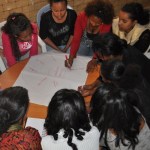posted by Robert Price & Bereket Aweke
What is Thinking Schools Ethiopia?
Transformative Design – Growing Thinking Schools from the Inside Out
 As noted in the previous blog posting Thinking Schools Ethiopia recently signed a Memo of Understanding to collaborate with the Addis Ababa Bureau of Education and the government (public) schools in Ethiopia’s capital city. Concurrently UNESCO International Institute for Capacity Building in Africa has recently stated its’ support in a document about Thinking Schools Ethiopia as a modern pedagogy. More will be shared on the support and collaboration with UNESCO-IICBA in an upcoming blog.
As noted in the previous blog posting Thinking Schools Ethiopia recently signed a Memo of Understanding to collaborate with the Addis Ababa Bureau of Education and the government (public) schools in Ethiopia’s capital city. Concurrently UNESCO International Institute for Capacity Building in Africa has recently stated its’ support in a document about Thinking Schools Ethiopia as a modern pedagogy. More will be shared on the support and collaboration with UNESCO-IICBA in an upcoming blog.
What are Thinking Schools?
Thinking Schools Ethiopia (TSE) is a school transformational model (child, educator, community) embodying 21st century thinking skills to improve the capacity of:
- students in pre-k, elementary, secondary and university as life long learners;
- educators to work collaboratively as a whole school community;
- Ethiopian master facilitators as model practitioners and trainers.
 The TSE approach includes the coordinated use of visual mapping, collaborative networking, reflective questioning, thinking skills, structuring environment, and developing dispositions to create, develop and sustain a research-based school transformational model.
The TSE approach includes the coordinated use of visual mapping, collaborative networking, reflective questioning, thinking skills, structuring environment, and developing dispositions to create, develop and sustain a research-based school transformational model.
The Thinking Schools Ethiopia (TSE) approach focuses on improving the quality of teacher effectiveness, applying research-based methodologies that are aligned with how the brain thinks and learns, and a systems thinking approach with whole school implementation. Assessment of students, educators and the implementation of TSE are accomplished using qualitative and quantitative methods including use of thinking skills tools.
 How is it different from existing approaches?
How is it different from existing approaches?
The Thinking Schools Ethiopia (TSE) approach is a whole school systems approach that builds capacity from within developing a foundation that is reflective, sustainable, replicable and collaborative. TSE is part of a greater global collaboration that supports bidirectional development. Bidirectional development is a belief system and model where all participants recognize their own capacity for aiding the others globally: ideas and innovation originate within and across all places globally.
The focus of Thinking Schools Ethiopia will be on the integration of 21st century thinking skills supported by research combined with using practical technological approaches.
 The Methodologies:
The Methodologies:
1. Reflective Questioning high quality questioning and listening skills
2. Thinking Skills explicit use of cognitive processes
3. Visual Mapping the use of visual tools to map out ideas
4. Collaborative Networking between us in pairs, groups, schools, and global networks that includes collaborative learning; collegial coaching; regional and global collaborations. Examples include collaborative learning, collegial coaching, professional learning communities, parent involvement.
5. Developing Dispositions characteristics, dispositions, and habits of mind are engaged
6. Structuring Environment considering how the physical space is organize and resources used
Thinking Schools Ethiopia collaborates with and is part of the greater network of Thinking Schools International. Projects are concurrently in Malaysia, United Kingdom, Norway, South Africa, Brazil and other countries.
www.thinkingschoolsinternational.com
 The thinking methodologies above are from the Thinking Schools International guide: Growing Schools from the Inside Out. The guide which is translated into Amharic, is used as part of the initial school leadership team training for each school to better understand its needs and vision in participatory centered workshops. Each team participates in TSE learner centered workshops using thinking methodologies to develop a sustainable plan for implementing thinking methodologies at their schools.
The thinking methodologies above are from the Thinking Schools International guide: Growing Schools from the Inside Out. The guide which is translated into Amharic, is used as part of the initial school leadership team training for each school to better understand its needs and vision in participatory centered workshops. Each team participates in TSE learner centered workshops using thinking methodologies to develop a sustainable plan for implementing thinking methodologies at their schools.
Phase 1 of the project between August 2009 – November 2011 involved over 2000 educators in Ethiopia participating in multiple day workshops. Participation by experts from Addis Ababa Bureau of Education (AABE), UNESCO-IICBA, many educators, school leaders and the Ministry of Education have led to the collaboration of TSE, AABE, UNESCO, Thinking Schools International and Thinking Foundation bringing together complimentary organizations supporting whole school and sustainable systems change.
 More on Thinking Schools can be seen on the Norway TV video clip with Richard Cummins – the CEO of Thinking Schools International part of the program. Thinking Schools Ethiopia is also finishing an informative video clip about Thinking Schools Ethiopia which will be shared here soon.
More on Thinking Schools can be seen on the Norway TV video clip with Richard Cummins – the CEO of Thinking Schools International part of the program. Thinking Schools Ethiopia is also finishing an informative video clip about Thinking Schools Ethiopia which will be shared here soon.
Thinking Schools – The Start of a Journey on Norway TV
http://www.neelb.tv/primary/thinking-schools/
Look at the video clips on the Thinking Schools Ethiopia YouTube:
http://www.youtube.com/user/TSEthiopia


